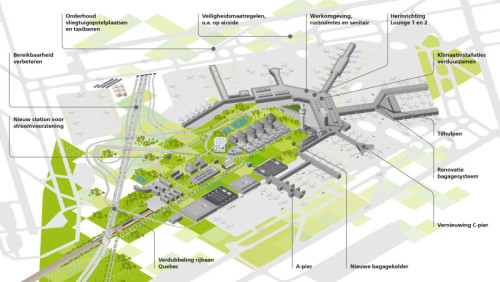Schiphol says that it is prioritising quality at the airport in its investments over the coming years. Between 2024 and 2027, the airport is investing €3bn into “catching up” on maintenance and upgrades. Important parts of the airport infrastructure – including Pier C, the baggage basement, climate-control systems, walkways, aircraft stands and taxiways – are due to undergo major maintenance or need renewing.
“After too much of a focus on costs and growth for many years, we must now play catch-up in order to offer employees, travellers and airlines the necessary quality,” said Ruud Sondag, CEO of Schiphol Airport. “Quantity took precedence over quality and that didn't do the assets at our airport any good. Things need to be done differently and investments need to be made in our location and facilities to align everything with our quality and sustainability ambitions.”
He added: “We are going to catch up on maintenance to improve, upgrade and make the airport more sustainable. This is necessary and in everybody's interest at the airport. Good working conditions, reliability, sustainability and safety are our starting points. It's a big task, with works at the heart of the airport and a continuous operation. Of course, we'll do everything we can to limit the risk of consequences for travellers and airlines, but some inconvenience cannot be ruled out.”
As of 31 March 2024, Schiphol has also announced that it will have less room for private jets. This was stated in the airport’s capacity declaration, the official document detailing the available capacity for the 2024 summer season. The declaration also states that the total number of permitted flights will decrease as the government's experimental scheme comes into effect on March 31, 2024.
The capacity declaration that Schiphol officially established states that there is room for a maximum of 280,645 flights in the 2024 summer season (31 March to 26 October 2024). That's around 12,400 fewer flights than in the summer of 2023. This is because Schiphol has taken the maximum of 460,000 flights in a full operating year (summer and winter) into account. This figure has been set out in the government's experimental scheme, which puts an end to anticipatory enforcement.
As a result of the experimental scheme, the proportion of 'small business traffic', including the number of private flights allowed, decreases by about 40%. The new maximum for the entire operating year is 12,000, with more than 7,200 during the summer season. That figure was 17,000 in the previous operating year. This development is in line with Schiphol's goal to eventually have a total ban on private flights to and from Schiphol. This is stated in the eight-point plan that Schiphol published in April. In addition to a ban on private jets, Schiphol also wants to introduce a night curfew and prohibit the noisiest planes from coming to the airport.
Schiphol states that it continues to pursue its policy of banning the noisiest planes and has listed 87 aircraft types that are “no longer welcome”. These types of aircraft were already no longer flying to and from Schiphol, but the ban in the capacity declaration means that there is a guarantee that they cannot come back either.
In addition to this ban, Schiphol says it encourages the use of quieter aircraft by way of airport charges. ‘Airlines need to pay five times more when flying with the noisiest and most polluting planes compared with when they make use of the quietest and cleanest aircraft’.
Meanwhile, Royal Schiphol Group, FNV and CNV have agreed on a follow-up to the social agreement for employees at the airport. The agreement comprises two parts: extending and then phasing out the labour market supplement on the one hand and structural actions and agreements regarding work at Schiphol on the other hand. The unions presented the agreement to their members.
The labour market supplement that Schiphol pays on top of the salaries of its employees at the airport is being extended to 31 December 2024. Security staff, cleaners and workers who accompany people with reduced mobility or in private bus transportation will receive an extra €1.40 gross for every hour worked until 1 September 2024. This is equivalent to around €200 a month for a full-time position. The labour market supplement will then be €0.70 from 1 September 2024 to 31 December 2024, when it will come to an end.
The ending of the supplement takes into account wage settlements for employees in collective labour agreements and the development of salaries, which will catch up with the amount that Schiphol pays. This catching up in collective labour agreements ensures that employees will not lose out compared to the current situation.

